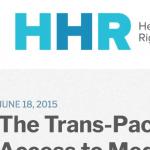Part of my job is to work alongside my law students as we represent low-income persons in our Indianapolis-based clinic. Our community does not have a strong public transit system, and many of the available jobs are located far away from where our clients live. Our clients need cars, but they do not have much cash or strong credit ratings. So they turn to the car dealers that populate their neighborhoods, filling concrete lots with shiny vehicles and bright signs promising great cars and forgiving financial terms.
Intellectual property protections for medicines are often overlooked in public discussions of U.S. trade agreements. But they shouldn’t be. Negotiations over such intellectual property can mean the difference between antiretroviral medicine that costs over $10,000 per year—the price originally set in the 1990s by monopoly patent holders—and the eventual grudging concessions that dropped the drug prices to less than a dollar a day. For millions of HIV-positive people in the developing world, that price gap is a matter of life and death. The same dynamic applies to patients in need of medicines to treat cancer, heart disease, and any number of other health conditions.
Representatives of Pacific Rim nations are negotiating a trade agreement that could negatively impact the health of millions. But the high-profile discussion about the proposed Trans-Pacific Partnership Agreement (TPPA) also presents an opportunity for health advocates. This Perspective essay first reviews key proposed terms of the TPPA that would extend the flawed pharmaceutical patent regime and violate multiple human rights commitments. Second, the social movement to ensure access to antiretroviral medicines is presented as an object lesson in successful advocacy for health as a human right. Finally, this essay argues that the attention paid to the TPPA by media, lawmakers, and social justice activists, particularly in the US, creates an ideal platform for advocacy in support of the human right to essential medicines.



